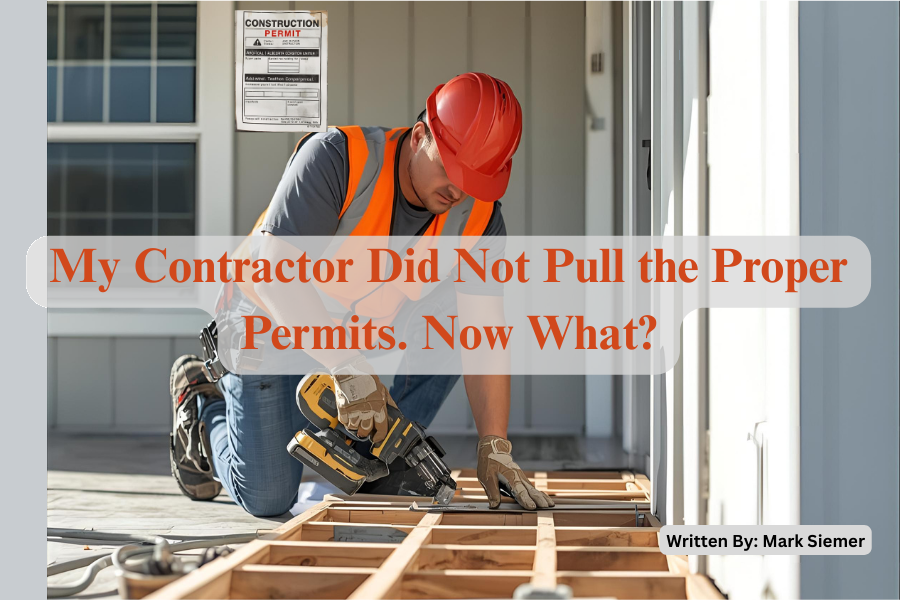My Contractor Did Not Pull the Proper Permits. Now What?
Posted: September 10th, 2025
Written By: Mark Siemer
What do you do when you find out your contractor did not pull the proper permits or pass the required inspection?
You begin the mysterious process of Back permitting, also known as retroactive permitting. The process of back permitting is vague and dependent on the local municipality and the personalities staffing the municipality because the Florida Building Code does not specifically address what to do in this situation.
Depending on how, and when, a property owner discovers the problem will determine how expensive and how difficult the problem is to fix.
What do I do after I discover the problem?
Discovering that your project required permits can be very shocking. Even worse, is discovering that you knew the project required permits, your contractor said they would pull permits, and then they didn’t. If the work is on going when the lack of permits is discovered, the interruption of the back permitting process likely going to be smaller. Why? Because the inspector will be able to see more of the work. If the work has already been completed and the contractor has been paid, then the interruption will likely much greater, why? Because the contractor is much less likely to take responsibility for the failure to secure a permit, the inspector will likely require you to demolish a portion of the project so they can inspect “behind the wall.” This might mean tearing up roofing material to inspect the waterproofing. This might mean taking core samples of the slab to test the strength of the concrete or it might mean cutting back drywall to see how the frame is assembled. All of which the property owner will have to pay for. The owner will also have to pay for redoing the work.
Do I have to comply with the new code?
The next question property owners frequently have is what happens if the last property owner did the work? It is still the current property owner’s responsibility to go through the back permitting process. Depending on how long ago the work was performed, the property owner might have an even bigger problem, did the code change?
If the code changes after the project was completed the inspector won’t approve the permit and inspections for a project that does not meet the current code. Even if it complied with the old code. That might put the current property owner in the position of redoing a substantial amount of work even though the work was of good quality and in good condition.
How does back permitting impact my costs?
What are the costs? It is impossible to predict until you do it. Because the process is so dependent on the people at the permitting office and the scope and stage of the work. For example, if the lack of permits is discovered while the work is ongoing, it might not cost the property owner anything because the contractor might correct their own mistake. If the permitting office requires an engineer to submit drawing of the “as-built” work, that could significantly increase your cost. If the permitting office requires you to tear up concrete so it can inspect the rebar, that will significantly increase your cost. If you have to close down a portion of your business while the walls are opened up so that the plumbing can be inspected, that will significantly increase your cost.
Who is responsible for back permitting?
Who is responsible for the cost of back permitting? The answer to this question has a legal answer and practical answer. And they are frequently different. The legal answer is that if the contract required the contractor to pull permits, the failure to do so is a breach of contract. If the contractor fails to remedy the situation, the owner can recover some or all of their damages based on what damages are waived by the contract.
The practical answer is that the consequences for failing to properly permit work fall on the property. Meaning, the property owner. The code enforcement action will most likely be directed to the property owner. It will also most likely happen faster than a lawsuit against the contractor. So, a property owner might find themselves fighting the code enforcement action while fighting a breach of contract claim. Both can be very expensive.
How can I protect myself?
The best way to deal with back permitting challenges is to avoid them altogether. Property owners should never rely exclusively on their contractor to determine if a permit is necessary and has been applied for. Permitting records are publicly available and can easily be accessed on the municipality’s website or by calling the building department.
Next, you should photograph as much of the work as possible. For example, if you have two dozen photographs of the rebar in your pool deck showing how it was laid, you might be able to avoid ripping up the concrete.
Ask at the beginning of the process if there will be a final inspection and attend it. The inspector will either pass the work or fail the work. If they fail the work, they will say why and what needs to be fixed. If the work fails, and you aren’t present, you might not know for a long time that the work failed.
Mark Siemer, is a Construction Attorney with Volk Law Offices, P.A., has 7 years’ experience and can be reached at help@volklawoffices.com or by visiting VolkLaw online at VolkLawOffices.com. Read more about Attorney Mark Siemer. Call for a consultation: (321) 726-8338.
The matters discussed here are general in nature and are not to be relied upon as legal advice. Every specific legal matter requires specific legal attention.
The law is constantly changing and matters discussed today may not be the same tomorrow. Legal matters are also subject to different interpretations by attorneys, judges, jurors and scholars. No attorney-client relationship is intended or created as a result of matters discussed here. You should consult counsel of your choice if you have any dealings in these areas of the law. Volk Law Offices, P.A. and its attorneys make no representations or warranties with respect to the accuracy or completeness of the matters addressed.

